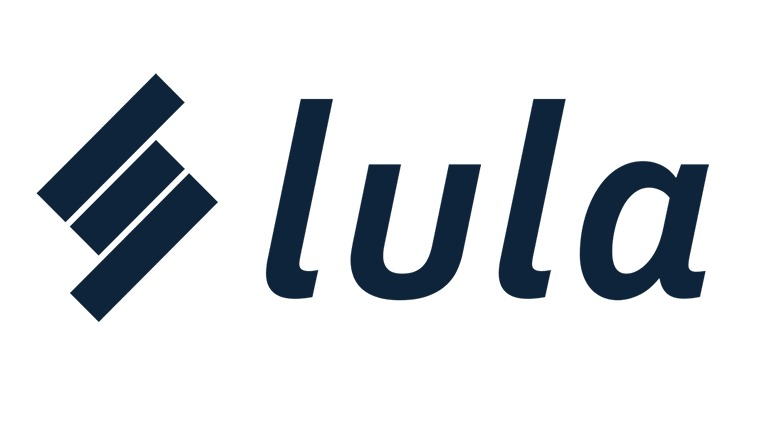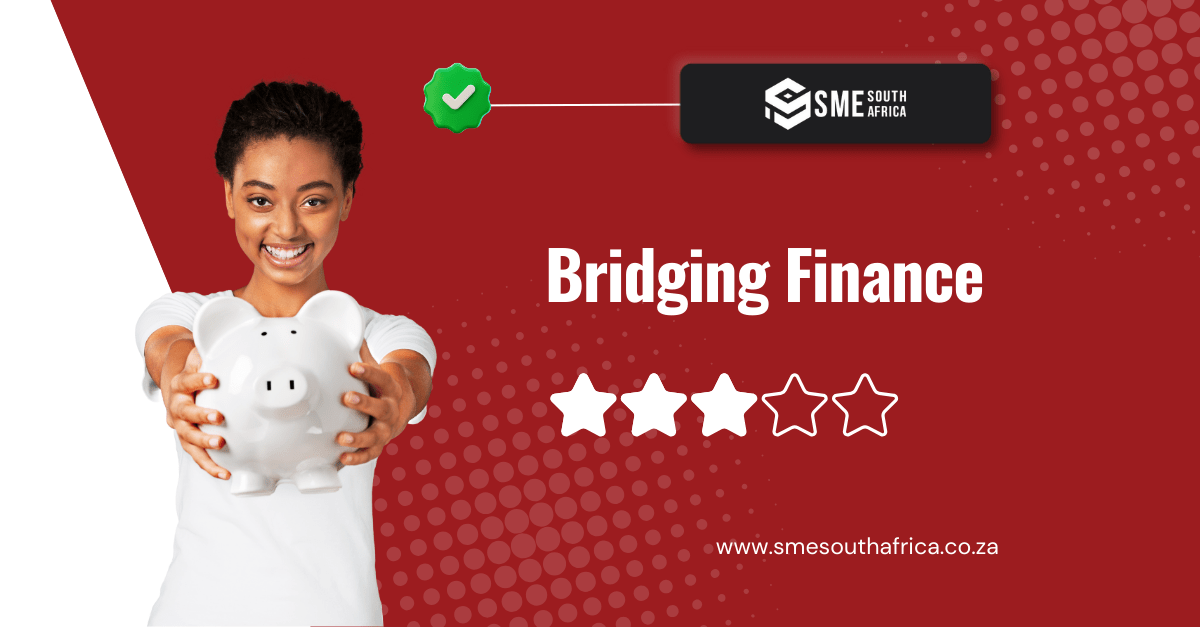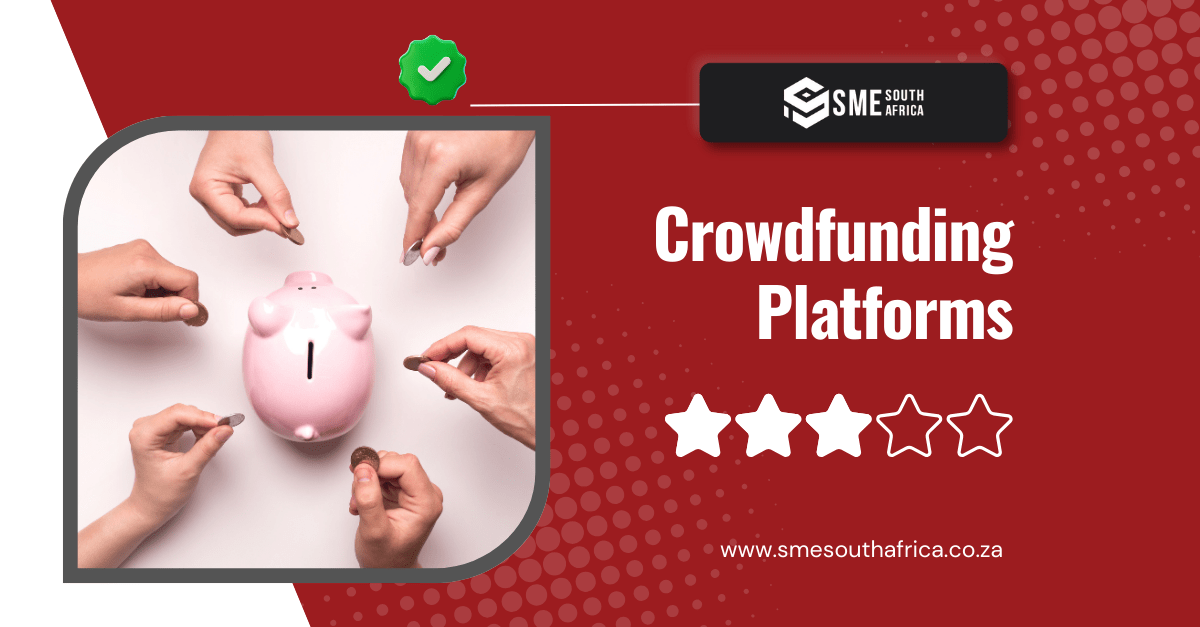
Access to funding is imperative for small businesses. As our economy grows, small businesses are set to play a huge role in job creation, eradicating poverty and growing the economy. Because of this, it’s important that these businesses receive the proper funding so that they can continue to grow.
Funding is the money you borrow or receive to help you buy equipment, better cash flow or expand your business. Most funding instruments require you to pay back the loan in monthly instalments. Other funding types do not have repayment but rather you give up a share of your company for the funding.
As a small to medium-sized enterprise (SME) owner, you need to know the different types of funding available so that you can apply for the right kind of funding.
Identifying the right kind of funding for your business saves you time and also prevents duplications for loans you might not need.
In this article, we look at the different types of funding available for your small business.
Bridging Loans
Bridging loans are short-term loans that help you with any cash flow issues in your business. They are quick cash injections that you can utilise while waiting for long-term loans or while resolving your cash flow issues.
The benefits of bridging loans include quick access to funds, flexible use, and security against your assets. However, like any other type of funding, bridging finance has its own disadvantages such as high interest rates, short repayment terms, the risk of losing collateral and the potential for negative equity.
Inventory Loans
Inventory loans help businesses to purchase stock. This type of loan is beneficial for product-based industries. Inventory loans are another type of short-term loan. The products that you purchase with the loan serve as collateral for the loan.
Inventory loans are unsecured loans, so you don’t need any collateral/assets to apply for them. The lender will look at how your business performs to assess the risk of giving you a loan.
Working Capital Loans
Working capital loans can help you increase the working capital of your business. This is a great financing option if you find yourself in a financial crunch and need an extra boost to your cash flow.
You can use your working capital loan to finance your everyday operations such as stock, payroll, and taxes such as VAT. However, you cannot use it for long-term assets like equipment or for investment opportunities.
Working capital loans can range from R 50 000 to R 5 million and have a quick vetting and approval process.
Crowdfunding
Crowdfunding is a type of funding that you can get from other people. The money you raise through crowdfunding can be used for anything within your business. Another thing that’s nice about crowdfunding is that you can raise funds for anything such as marketing projects, business expansion or even something personal like a medical emergency.
Revolving Credit Line
A revolving credit line is a type of funding where you only pay back the money you have used. Most people know this as a business credit card. This is a great type of funding for small businesses because it can help with cash flow, daily needs like fuel, and office supplies and paying suppliers or freelancers. You can also use it for any emergency.
You can get a business credit card from any traditional bank. You must just pick the one with the best rates for you.
Purchase Order Funding
Purchase order funding is for those who need to fulfil any contract orders or large orders. If you have limited capital, you can use purchase order funding to fulfil the order before you secure the payment from the customer.
Purchase order funding is typically used by those who get government tenders. Usually, when you apply for this type of funding, the lender will check on the customer (contractor) before they give you the funds.
Government Funding
The South African government has a number of funding options and agencies aimed at helping small businesses. Some of the funding instruments include grants, incentives and equity funding.
The government funding agencies include the National Empowerment Fund (NEF), the Small Enterprise Development Agency (SEDA) and the Small Enterprise Funding Agency (SEFA).
Venture Capital Funding
Venture capital funding is a great funding instrument for new businesses with potential for long-term growth. Typically a venture capitalist will invest capital into an existing business that needs capital to grow.
A benefit of venture capital funding is that it does not come with just funding. With the right venture capitalist investing in your business, you will receive practical business mentorship and gain access to a network of other potential investors.
Some venture capitalists can be considered as angel investors. Angel investing is similar to venture capital funding.
Incubators/Accelerators
Incubators and accelerators usually have funding opportunities for their participants. Although the concept of incubators and accelerators is similar, their funding options are not the same.
Incubators are usually focused on giving entrepreneurs an environment where they can generate new ideas. These incubators are often used by government agencies, universities and private companies. Not all incubators provide funding or mentorship, so it’s all about choosing the right one.
Accelerator programmes combine small seed investment rounds with start-up business mentorship. Usually, the participants are given a period to meet certain goals and if the goal is reached, you will get funding.
These are some of the funding types available for small businesses. If you need funding, read through the article so you can see exactly what kind of funding you need. Once you have identified it, find the right lender and begin applying for your business funding.
For more information on funding for your business, visit the SME South Africa funding page.












